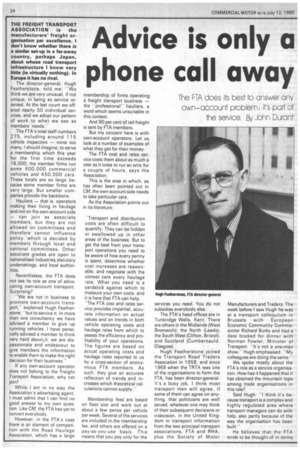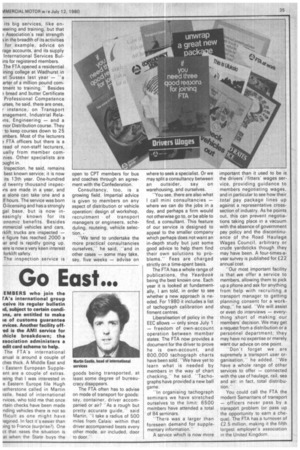Advice is only a phone call away
Page 36

Page 37

If you've noticed an error in this article please click here to report it so we can fix it.
The FTA does its best to answer any own-account problem: it's part of the service. By John Durant
THE FREIGHT TRANSPORT ASSOCIATION is the manufacturers' freight organisation par excellence. I don't know whether there is a similar set-up in a far-away country, perhaps Japan, about whose road transport infrastructure I know very little (ie virtually nothing). In Europe it has no rival.
The director-general, Hugh Featherstone, told me: We think we are very unusual, if not unique, in being so service or iented. At the last count we offered nearly 50 individual ser
vices, and we adopt our pattern of work to what we see as members' needs.
The ETA's total staff numbers 275, including around 115 vehicle inspectors — none too many, I should imagine, to serve a membership which this year for the first time exceeds 16,000; the member firms run some 400,000 commercial vehicles and 450,000 cars. These totals are so large because some member firms are very large. But smaller companies provide the backbone.
Hauliers — that is, operators making their living in haulage and not on the own-account side
— can join as associate. members, but they are not
allowed on committees and therefore cannot influence policy, which is decided by members through local and national committees. Other associate grades are open to nationalised industries, statutory undertakings, and local authorities.
Nevertheless, the FTA does not see its role as one of advocating own-account transport. Surprising?
"We are not in business to promote own-account trans
port," explained Hugh Feather stone, but to service it. In more than one consultancy we have advised a member to give up running vehicles. I have personally advised a member to think
very hard about\ it; we are dispassionate and endeavour to give members the information to enable them to make the right decision for their business.
If any own-account operator does not belong to the Freight Transport Association, why not join?
While I am in no way the Association's advertising agent, I must admit that I can find no good answer to my own question. Like CM, the FTA has yet to Convert everybody.
However, in the FTA's case there is an element of competition with the Road Haulage Association, which has a large
membership of firms operating a freight transport business — the -professionalhauliers, a word which seems unsuitable in this context.
And 90 per cent of rail freight is sent by FTA members.
But my concern here is with own-account operators. Let us look at a number of examples of what they get for their money.
The FTA cost and rates service costs them about as much a year as it costs to run an artic for a couple of hours, says the Association.
This is the area in which, as has often been pointed out in CM, the own-account side needs to take particular care.
As the Association points out in its literature:
-Transport and distribution costs are often difficult to quantify. They can be hidden or swallowed up in other areas of the business. But to get the best from your transport operations you need to be aware of how every penny is spent, determine whether cost increases are reasonable, and negotiate with the utmost care every haulage rate. What you need is a yardstick against which to measure your own costs, and it is here that FTA can help. "The FTA cost and rates service provides impartial, accurate information on actual values and on trends in both vehicle operating costs and haulage rates from which to assess the efficiency and profitability of your operations. The figures are based on actual operating costs and haulage rates reported to us by a cross-section of anonymous FTA members. As such, they give an accurate reflection of trends and increases which theoretical calculations cannot supply."'
Membership fees are based on fleet size and work out at about a few pence per vehicle per week. Several of the services are included in the membership fee, and others are offered on a pay-as-you-use basis. This means that you pay only for the services you need. You do not subsidise everybody else.
The FTA's head offices are in Tunbridge Wells, Kent. There are others in the Midlands (West Bromwich); the North (Leeds); the South West (Clifton, Bristol); and Scotland (Cumbernauld, Glasgow).
Hugh Featherstone joined the Transport Road Traders Association in 1958, and since 1969 when the TRTA was one of the organisations to form the FTA, has been director-general. It's a busy job. I think most transport men will agree, if some of them can agree on anything, that politicians are well served, whatever one may think of their subsequent decisions or indecision, in the United Kingdom in transport information from the two principal transport associations, FTA and RHA, plus the Society of Motor Manufacturers and Traders. The week before I saw Hugh he was at a transport colloquium in Brussels with European Economic Community Commissioner Richard Burke and had a date booked for dinner with Norman Fowler, Minister of Transport. "It's not a one-man show," Hugh emphasised. "My colleagues are doing the same."' We spoke mostly about the FTA's role as a service organisation. How has it happened that it has obtained the mountain tops among trade organisations in this role?
Said Hugh: "I think it's because transport is a complex and highly regulated area where transport managers can do with help, also partly because of the way the organisation has been built."
He believes that the FTA tends to be thought of in terms
its big services, like enleering and training, but that .1 Association's real strength 3 in the breadth of its activities for example, advice on rage accounts, and its supply International Services Bulins for registered members. The FTA opened a residential ining college at Wadhurst in st Sussex last year — "'a arter of a million pound corntment to training." Besides bread and butter Certificate Professional Competence urses, he said, there are ones, r instance, on Transport anagement, Industrial Relains, Engineering — and a nior Distribution course. They to keep courses down to 25 .mbers. Most of the lecturers
FTA officers but there is a read of non-staff lecturers, ually from member cornflies. Other specialists are aught in.
Inspection, he said, remains best known service; it is now its 13th year. One-hundred id twenty thousand inspecins are made in a year, and ie alone can take one and a If hours. The service was born 0-licensing and has a strongly gal base, but is now ineasingly known for its 'onomic benefits. Besides .mmercial vehicles and cars, rklift trucks are inspected — e figure has reached 2000 a !ar and is rapidly going up. iere is now a very keen interest forklift safety.
The inspection service is open to CPT members for bus and coaches through an agreement with the Confederation.
Consultancy, too, is a growing field. Impartial advice is given to members on any aspect of distribution or vehicle operation: design of workshop, recruitment of transport managers or engineers, scheduling, routeing, vehicle selection. • "We tend to undertake the more practical consultancies ourselves,'" he said, "and in other cases — some may take, say, five weeks — advise on where to seek a specialist. Or we may split a consultancy between an outsider, say on warehousing, and ourselves.
-You see, there are also what I call mini consultancies — where we can do the jobs in a day, and perhaps a firm would not otherwise go to, or be able to find, a consultant. This feature of our service is designed to appeal to the smaller company which perhaps does not want an in-depth study but just some good advice to help them find their own solutions to problems.Fees are charged strictly on a time-spent basis.
The FTA has a whole range of publications, the Yearbook being the best known one. Each year it is looked at fundamentally, I am told, in order to see whether a new approach is needed. For 1980 it includes a list of tachograph calibration and fitment centres.
Liberalisation of policy in the EEC allows — only since July 1 — freedom of own-account operation between member states. The FTA now provides a document for the driver to prove he is own-account, and 800,000 tachograph charts have been sold. -We have yet to learn what is needed by members in the way of chart checking,he said. "Tachographs have provided a new ball game.
'In organising tachograph seminars we have stretched ourselves to the limit: 6500 members have attended a total of 84 seminars.
"There was a larger than foreseen demand for supplementary information.
A service which is now more important than it used to be is the drivers" /fitters' wages service, providing guidance to members negotiating wages, and in particular to see how their total pay package lines up against a representative crosssection of industry. As he points out, this can prevent negotiations taking place in a vacuum with the absence of government pay policy and the discontinuance of the Road Haulage Wages Council, arbitrary or crude yardsticks though they may have been. A four-times-ayear survey is published for £22 annual cost.
-Our most important facility is that we offer a service to members, allowing them to pick up a phone and ask for anything from help with recruiting a transport manager to getting planning consent for a workshop,he said. "We will assist or even do interviews — everything short of making our members' decision. We may get a request from a distribution or a personnel department; they may have no expertise or merely want our advice on one point.
"Don't forget we are supremely a transport user organisation,he added. "We have a whole range of other services to offer — connected with the use of haulage, rail, sea and air in fact, total distribution.
You could call the ETA the modern Samaritans of transport — officers never pass by a transport problem (or pass up the opportunity to earn a cheque). The FTA has a turnover of £2.5 million, making it the fifth largest employer's association in the United Kingdom_












































































































































